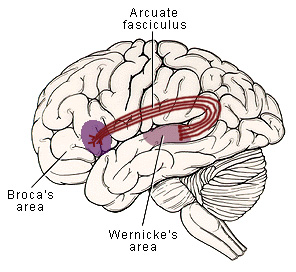Broca's area
From Psy3241
| Line 18: | Line 18: | ||
== Damage to Broca's area == | == Damage to Broca's area == | ||
| - | If Broca's area is damaged, people will suffer from a condition called ''[[Broca's aphasia]]''. This condition is also sometimes called ''expressive aphasia'', ''nonfluent aphasia'', or ''motor aphasia''. | + | If Broca's area is damaged, people will usually suffer from a condition called ''[[Broca's aphasia]]''. This condition is also sometimes called ''expressive aphasia'', ''nonfluent aphasia'', or ''motor aphasia''. Broca's aphasia makes people unable to create sentences that are gramatically complex. In addition, the sentences usually contain very few words related to content. |
Revision as of 16:34, 20 April 2008
Broca's area is the area in the brain that is responsible for speech production, language processing, and language comprehension. Broca's area was first discovered in 1861 by Pierre Paul Broca, after studying the postmortem brain of one of his patients who had a speech impediment.
Description
Broca's area is located in the left frontal lobe, around the opercular and triangular sections of the inferior frontal gyrus. It is connected to Wernicke’s area of the brain by the arcuate fasciculus, which is a pathway made of neurons. (see below).
Parts
Broca's area contains two main parts: the Pars triangularis and the Pars opercularis.
The Pars triangularis is located in the anterior part of Broca's area. Researchers believe that this area of the brain is responsible for helping the human brain interpret different stimulus modes. It also supports the programming of verbal conducts.
The Pars opercularis is located in the posterior part of Broca's area. It is believed that this area supports only one stimulus mode, rather than multiple modes like the Pars triangularis. This portion of Broca’s area is also believed to coordinate the organs used for speech in order to produce language.
Damage to Broca's area
If Broca's area is damaged, people will usually suffer from a condition called Broca's aphasia. This condition is also sometimes called expressive aphasia, nonfluent aphasia, or motor aphasia. Broca's aphasia makes people unable to create sentences that are gramatically complex. In addition, the sentences usually contain very few words related to content.

